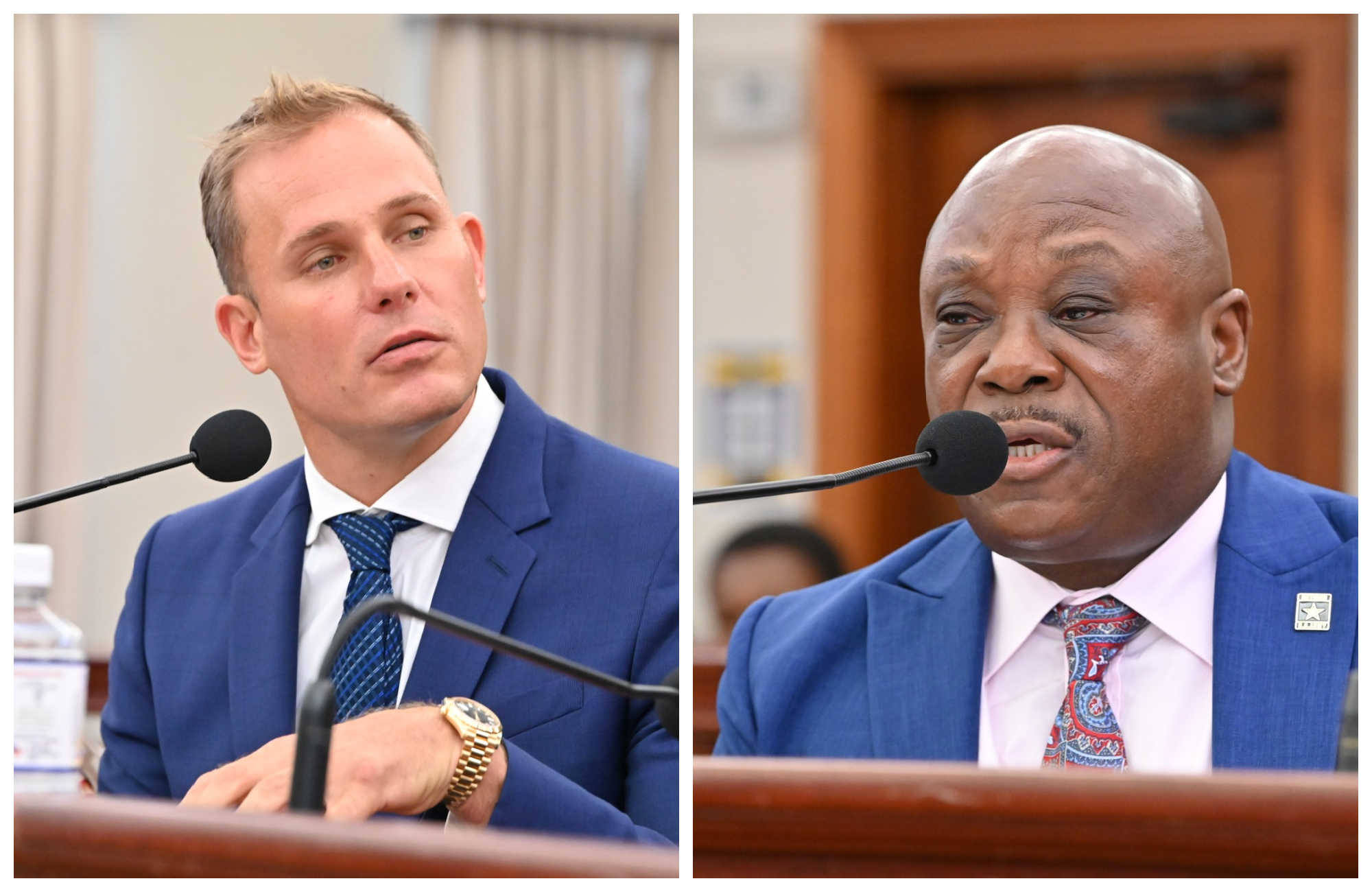Senate
New Legislative Effort to Address Non-Consensual Sharing of Explicit Images in the Virgin Islands

The Virgin Islands Senate recently took a significant step toward protecting individuals from the unauthorized dissemination of sexually explicit images, commonly referred to as “revenge porn.” Senator Donna Frett-Gregory spearheaded the initiative, presenting Bill 35-0182 to the Committee on Homeland Security, Justice, and Public Safety. This proposed legislation aims to amend Title 14, Chapter 51 of the Virgin Islands Code, introducing stringent measures against the non-consensual sharing of explicit images.
With the advent of digital technology, the phenomenon of revenge porn has emerged as a disturbing trend, victimizing individuals by exposing their privacy to public scrutiny without consent. The bill proposes to tackle this issue head-on by categorizing the first offense as a misdemeanor, punishable by up to a year in prison, and elevating subsequent offenses to felony status. Victims would have two years to file a criminal complaint from the moment they become aware of the incident.
The Virgin Islands joins a concerted effort across 48 states, the District of Columbia, Guam, and Puerto Rico, where similar laws have been established to curb this invasive practice. The bill specifically targets the intentional distribution of non-consensual sexually explicit material aimed at harassment, intimidation, or causing harm to the victim, marking it as the territory’s 15th domestic violence crime.
Timothy Perry, representing the Department of Justice for St. Thomas, St. John, and Water Island, acknowledged the bill’s intent but suggested refinements to its language to eliminate potential legal defenses that could hinder prosecution. He highlighted the need for clarity on the intent to harass and knowledge of the necessity for consent.
The Virgin Islands Police Department (VIPD), through Assistant Commissioner Mario Brooks, expressed support for the bill, underscoring the traumatic impact of non-consensual pornography on victims. Brooks, however, raised concerns about the bill’s age limitations, pointing out the significant incidence of such crimes among minors, especially within educational settings.
The bill has ignited a broader discussion on the resources required for effective enforcement, with both the VIPD and the Department of Justice emphasizing the need for a comprehensive plan to accompany the new legislation. The Office of the Territorial Public Defender and the Women’s Coalition of St. Croix have also contributed to the dialogue, emphasizing the importance of addressing repeat offenders and the challenges faced by victims in reporting these crimes due to societal stigma.
The legislative committee’s overwhelming support for the bill, coupled with a call for public awareness campaigns by Senator Alma Francis-Heyliger, underscores the community’s commitment to combating this issue. Dr. Clema Lewis of the Women’s Coalition of St. Croix voiced her organization’s readiness to lead educational efforts, highlighting the critical role of awareness in prevention.
As the bill moves to the Committee on Rules and Judiciary, the Virgin Islands stands on the cusp of significant legal reform aimed at safeguarding personal dignity and privacy in the digital age, reflecting a collective resolve to address and prevent the harm caused by the non-consensual sharing of sexually explicit images.
Senate
Conn Davis II and Lindel Williams, Nominated to Waste Management Board, Impress Lawmakers

Governor Albert Bryan Jr.’s nominees, Conn Davis II and Lindel Williams, have garnered significant support from lawmakers on the Committee on Rules and Judiciary for their appointments to the Waste Management Authority (WMA) Board of Directors.
Both nominees come with substantial financial management backgrounds and expressed a strong commitment to enhancing waste management systems. During the committee meeting on Thursday, they articulated their vision for a more efficient and effective waste management infrastructure in the Virgin Islands.
Conn Davis II, poised to represent St. Thomas on the board, brings experience as a financial trader and has worked with companies focused on converting waste to clean energy. “I’ll bring a great work ethic, strong financial and operational expertise, and a deep global business network to the V.I. Waste Management Authority,” Davis assured legislators. He emphasized that waste management is “one of the most fundamental and essential functions of government.”
Davis advocated for a thorough assessment of the current waste management scenario, incorporating best practices, and setting clear goals. He stressed the importance of accountability to various stakeholders, including staff, citizens, vendors, contractors, and the U.S. Environmental Protection Agency. Additionally, Davis proposed exploring creative funding mechanisms, such as an advanced disposal fee on incoming goods at ports of entry, as an alternative to the existing tipping fees.
Lindel Williams, nominated to represent St. Croix, is a military veteran with international engineering and construction experience. As a former commissioner of the Department of Public Works, he oversaw waste management operations. Williams highlighted the necessity of accountability to the public, compliance, and responsible use of public funds. He also pointed out the need for innovative financing, including public-private partnerships.
Williams outlined several goals, including employee training, rebranding the WMA as a desirable workplace, repairing the sewer system, building new pump stations, and improving landfill management. Lawmakers were particularly impressed with his ability to manage multi-million dollar portfolios.
During the hearing, senators posed various questions regarding the nominees’ strategies for wastewater management, reducing green waste, long-term plans, public education, and waste collection fees. Davis emphasized the importance of changing public perceptions of waste management, linking it to health, beautification, and tourism. Williams agreed, highlighting the need for robust public education to shift mindsets.
Despite awaiting formal confirmation, both nominees offered numerous suggestions to improve waste management. Senator Kenneth Gittens praised their financial expertise, stating, “the Virgin Islands does not have a money problem, but rather a money management problem.” He urged the nominees to leverage their skills to enhance the authority’s operations and proposed new legislation to improve the WMA and ensure a cleaner, healthier environment in the territory.
Senate
Bill Allowing Government Employees to Seek Public Office Without Taking Leave Defeated in Senate

Another attempt by Senator Marise James to pass legislation permitting government employees to seek political office while employed by the Government of the Virgin Islands (GVI) has stalled. The motion to move the bill forward during Thursday’s meeting of the Committee on Rules and Judiciary failed as her colleagues did not second it.
Proponents argue that the defeat of this legislation maintains a significant barrier for government employees wishing to enter politics. Currently, they must take unpaid leave to run for office, leading to financial and professional instability. This requirement discourages many potential candidates, thereby limiting competition and benefiting incumbent lawmakers who face less competition.
Bill 35-0032, introduced last September, would allow employees to seek office while employed unless prohibited by federal or other laws. The bill faced substantial opposition from lawmakers, including Senators Kenneth Gittens and Carla Joseph, over concerns about conflicts of interest, misuse of taxpayer dollars, and potential policy violations.
Amendments were recommended, including changes by Elections Supervisor Caroline Fawkes and Chief Justice Rhys Hodge. The chief justice advised excluding judicial branch employees from the bill, citing strict guidelines on their political activity. Although Senator James complied with this request and considered other amendments, the latest version of the bill was not shared with invited testifiers nor posted on the Legislature’s website as of press time.
Senator James argued that requiring government employees to vacate their posts to run for office is unfair and disrupts government operations, especially during election cycles. She suggested that her proposal would increase the pool of candidates and reduce the financial burden of campaigning.
While invited testifiers generally supported the amended measure, they suggested further refinements. Ms. Fawkes recommended changing the start of mandatory leave for government employees contesting political office to the absentee ballot casting date rather than the first day of early voting, as the latter is flexible and varies each election cycle.
Despite some support, the bill faced overwhelming opposition from lawmakers. Senator Angel Bolques Jr. expressed concerns about potential issues and ambiguities, while Senator Franklin Johnson worried about conflicts of interest between official duties and political ambitions. Senator Kenneth Gittens reiterated his skepticism, fearing that the bill might encourage misuse of government resources.
The motion to advance the proposal out of committee did not receive a second, leaving Senator James “speechless.” Despite this setback, she emphasized the need to avoid the financial hardship associated with campaigning and expressed hope that future efforts might succeed in changing the law.
Bill 35-0032 remains in the Committee on Rules and Judiciary at the chair’s call.
Senate
Jurors, Witnesses to Receive Increased Payments if Proposed Measure Becomes Law

The Senate Committee on Rules & Judiciary has advanced a proposal aimed at increasing compensation for jurors and witnesses in the Virgin Islands. Currently, jurors receive $50 per day under federal law, while witnesses receive $40. Local statutes, dating back to 1957, offer witnesses only $4 to $8 per day, and local courts established in 1976 pay jurors $40 per day, plus $5 for transportation costs.
Bill 35-0121 proposes increasing these rates to $80 per day for jurors, payable in $40 half-day increments. Jurors who participate in selection but are not chosen will receive $20 per day, a point of contention for Senator Marise James, who argues for equal compensation for all jurors. Additionally, the bill includes provisions for reasonable compensation for travel, parking, and a subsistence allowance for meals and lodging.
Government employees are excluded from these payments. Witnesses would also receive $80 per day for court attendance, plus a $100 allowance for subsistence, travel time, and inter-island travel costs if they live outside the district where the court proceedings are held.
Senator Novelle Francis, co-sponsor of the bill, emphasized the financial burden jury service imposes on citizens, which can hinder the ability to form a diverse jury. Chief Territorial Public Defender Julie Todman supported the measure, stating that adequate juror compensation is crucial for maintaining a robust judicial system. She highlighted the American Bar Association’s stance that juror compensation should cover routine expenses such as travel, parking, meals, and childcare. This measure, she noted, would elevate the Virgin Islands from one of the lowest to one of the highest in juror compensation.
Deputy Attorney General Ian Clement voiced support for the bill but pointed out that the proposed legislation lacks clarity on who will fund the increased payments and suggested that local government employees should not receive payments when testifying on behalf of the government. He also questioned the exclusion of federal employees from these payments.
Regina Peterson, Administrator of Courts for the Judiciary of the Virgin Islands, proposed that the new pay rate should be a minimum threshold, allowing adjustments for inflation and cost of living. She also noted the projected doubling of jury service costs to approximately half a million dollars annually, to be included in the judiciary’s upcoming budget submission. Ms. Peterson clarified that while the judiciary handles jury compensation, witness payments are the responsibility of the party calling the witness.
Jessica McKinney, chair of the Legislation and Law Reform Committee of the Virgin Islands Bar Association, recommended aligning the juror payments with the current minimum wage, raising the base to $84 per day to maintain consistency. She suggested further adjustments to enhance the bill’s flexibility.
Despite calls for language amendments, Bill 35-0121 passed unanimously in committee, with further discussions expected to refine and strengthen the legislation.
-

 Education1 year ago
Education1 year agoEducation Board Seeks Input on Schools Through Comprehensive Survey
-

 Education2 years ago
Education2 years agoCTE Board Enthusiastic About New Curriculum Standards, Yet Anxious Over Apprenticeship Support
-

 Crime2 years ago
Crime2 years agoRegistered Sex Offender Detained for Illegal Firearm Possession During Annual Surveillance Drive
-

 Videos3 years ago
Videos3 years ago2022 Gubernatorial Election: Voters Speak Out
-

 Development1 year ago
Development1 year agoCosts Surge as Donoe Estates Housing Project Resumes with New Contractor
-

 Videos3 years ago
Videos3 years agoGubernatorial Teams Celebrate St. Croix’s Bull & Bread Day
-

 Videos3 years ago
Videos3 years agoWakanda’s Female Might: A Dive into ‘Black Panther: Wakanda Forever’
-

 Crime2 years ago
Crime2 years agoSt. John’s Westin Resort Scene of Armed Robbery, Prompting Heightened Police Vigilance




